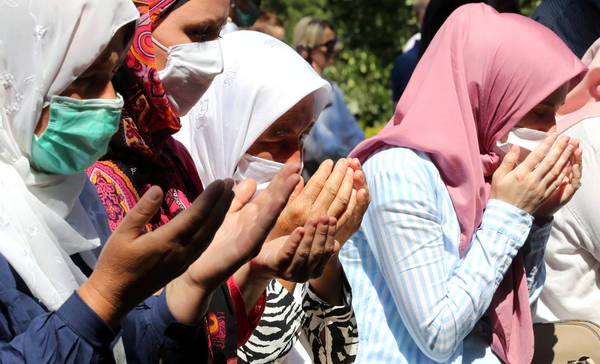Genocide, 25th anniversary, commemoration in Srebrenica
Bosnian Serbs slaughtered more than 8,000 Muslim men
10 July, 17:37The International Criminal Tribunal for the former Yugoslavia (ICT) established that the genocide had been meticulously planned. In Srebrenica, an enclave that the UN declared "safe area" in 1993, tens of thousands of Bosnian refugees took shelter, surrounded and besieged for years by the Bosnian Serbian army. On the morning of 11 July 1995, the men commanded by Bosnian Serbian general Ratko Mladic conquered the city, causing the exodus of thousands of civilians who, in panic, sought in vain for shelter at the UN base in Potocari, manned by Dutch blue helmets.
About 5,000 people found shelter inside the compound, to then be expelled and handed over to their torturers, whereas another 20,000 remained outside in makeshift campsites. In the following days, the massacre took place, with the killing of more than 8,000 Muslim men, and their corpses were then hidden in mass graves. "We saw our husbands and children seek shelter in the woods around Potocari and then we have lost track of them," said before the ICT judges Mirsada Malagic, who testified before the Court in 2000 and then again in 2011. Only a partial justice has been achieved for these crimes: about twenty genocide convictions issued by international and local courts. Ratko Mladic was punished with life imprisonment in 2017 for planning "the elimination of Bosnian Muslims by killing men and boys." As for Mladic, the appeal sentence was delayed due to the pandemic. Radovan Karadzic, the political leader of the Bosnian Serbs during the conflict, was sentenced first to 40 years and then to life imprisonment. These verdicts do not wipe out what was "the worst atrocity committed in Europe since the Second World War," underlined the UN Secretary-General, Antonio Guterres, in a video message. "Twenty-five years later we pay tribute to the thousands of men who were brutally killed, and we promise we'll never forget them, and again we express our solidarity with the survivors." But Srebrenica remains a failure for the international community that "will persecute our history forever," Guterres said, quoting the words of former UN Secretary-General Kofi Annan.(ANSA).














